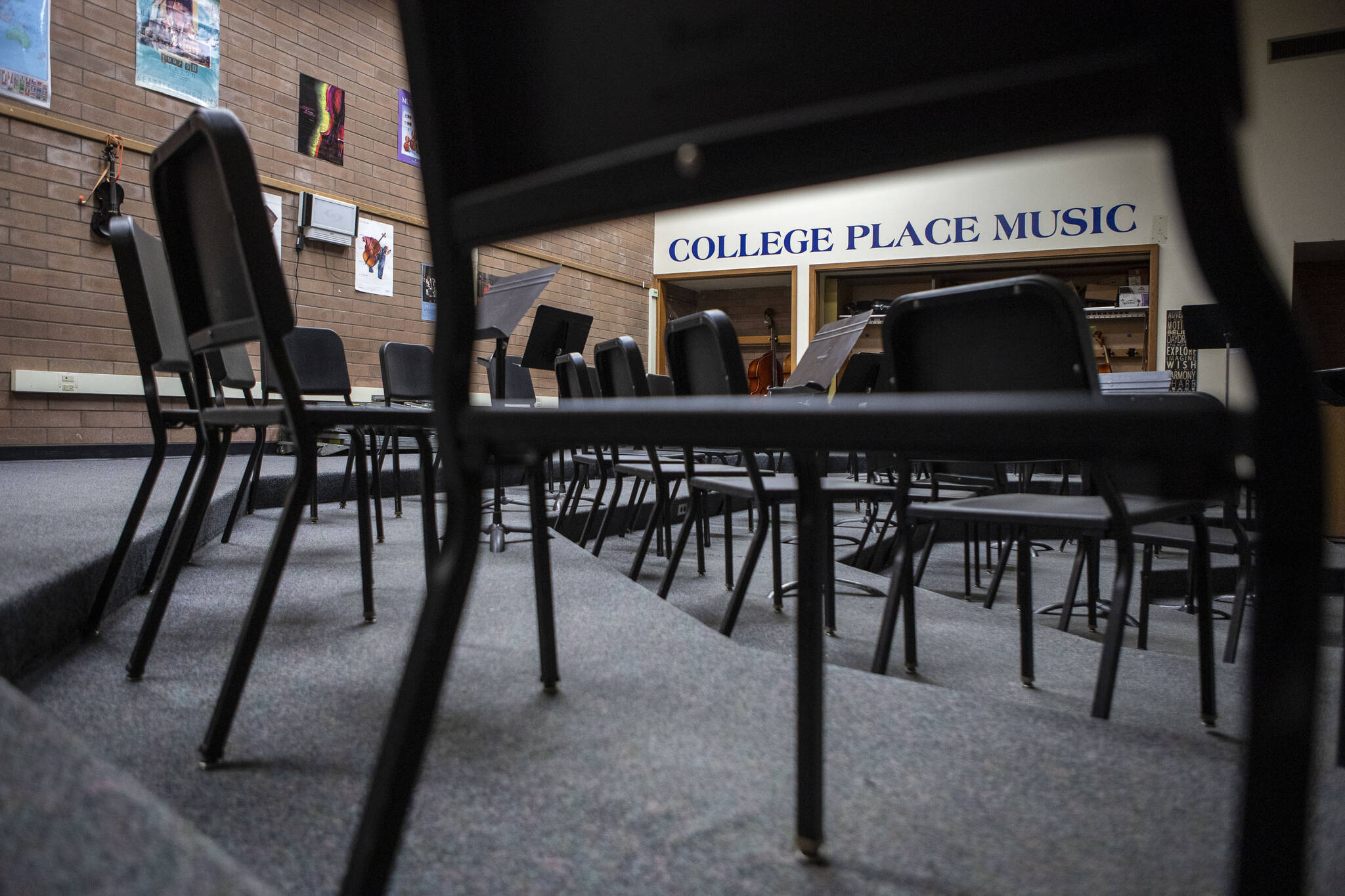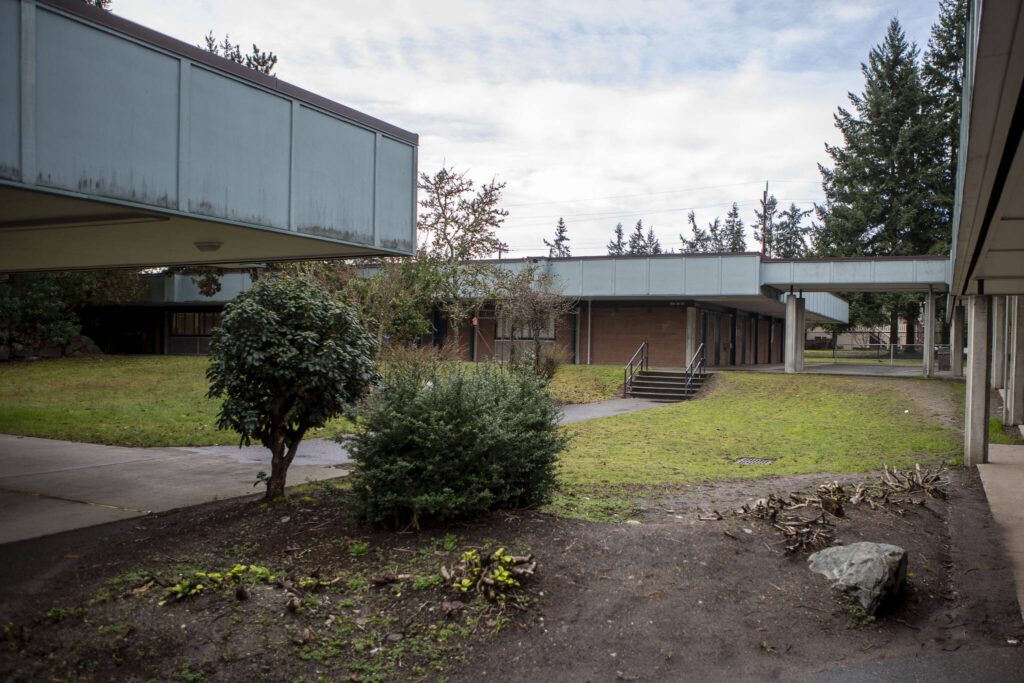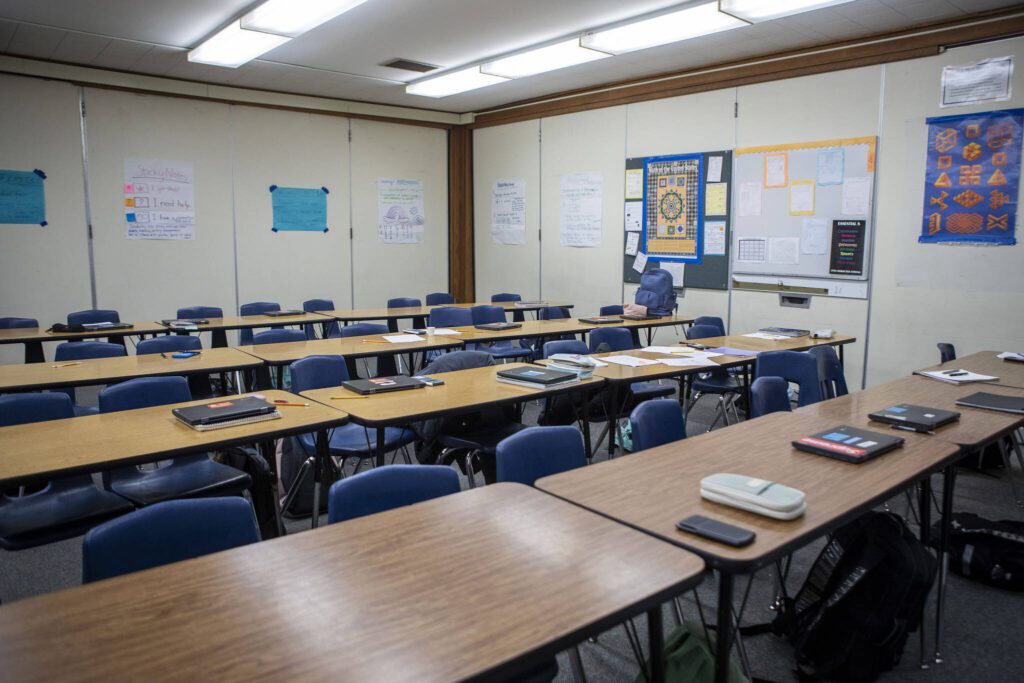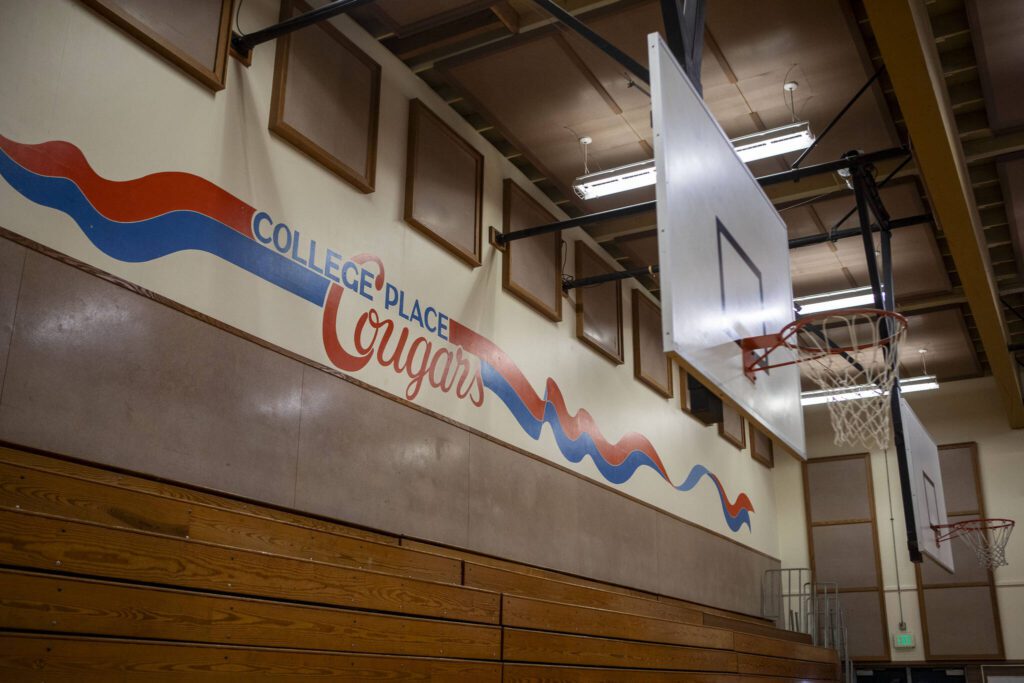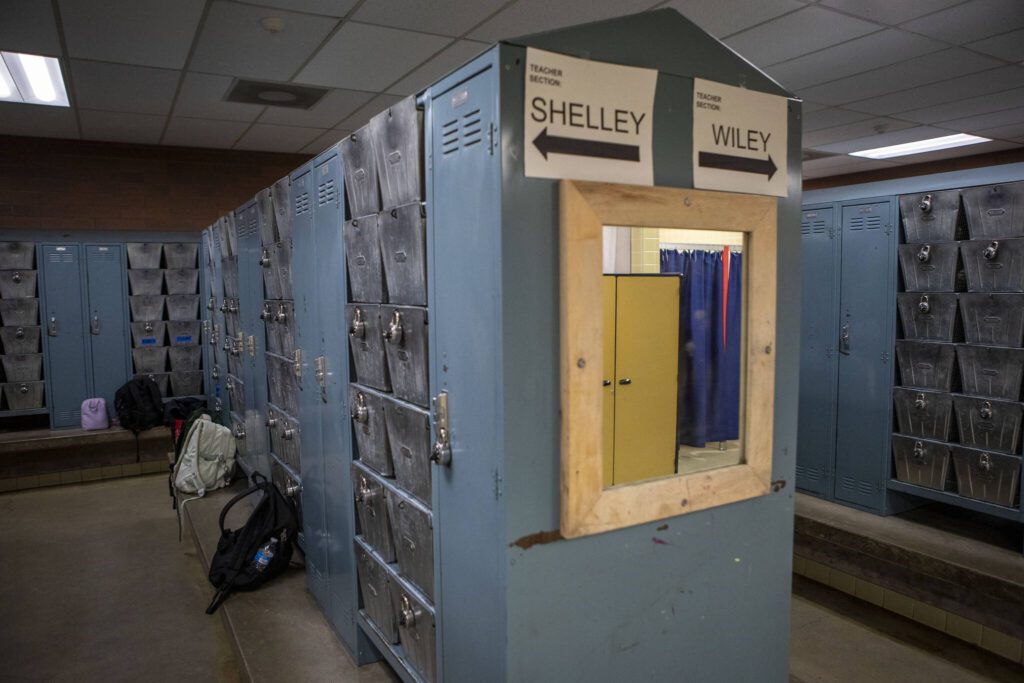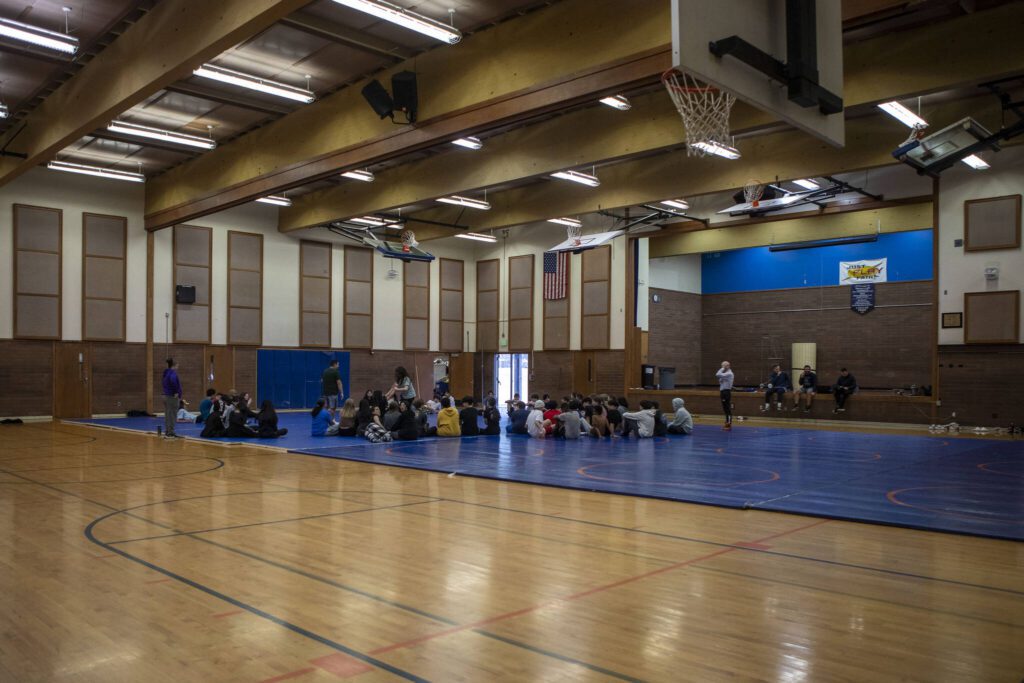LYNNWOOD — Out of 34 schools in the Edmonds School District, 15 were built over 50 years ago.
For the most part, they haven’t been updated.
College Place Middle School, built in 1970, is one of the buildings long overdue for an overhaul.
On a tour Thursday, Principal Andrea Collins pointed out there are only 11 toilets for 600 middle school students. Most of the drinking fountains are outside and need to be turned off in winter. Wheelchair ramps are sparse, meaning a student who needs a wheelchair has to use a detachable ramp to get up the risers in the band room.
Classrooms are cramped, too. In Mike Montanari’s science class of over 30 kids, a student has to sit in the corner because there isn’t enough room at the tables. The teacher noted the lack of sprinklers on the ceiling in case a science experiment gone wrong.
These are among the reasons why, for the seventh time in a decade, the district is asking voters to approve bonds and levies for upgrades. This time it’s two measures worth more than $700 million on the Feb. 13 special election ballot.
Other districts across the county have similar measures on the ballot, including Arlington, Lakewood, Stanwood-Camano and Sultan.
Passage of Edmonds’ measure would have no immediate effect on tax rates, according to Yes for ESD Kids, a volunteer group advocating for the measures. A capital levy expires in 2027, at which point if the bonds don’t pass, revenues would drop off.
Tax rates are expected to stay at $2.65, regardless of if the two measures are passed or not, in 2025. That’s because if the bond measure is approved, it would replace the six-year capital levy passed in 2021, using bond funds to finish construction of Oak Heights Elementary at a faster rate.
It’s like using a credit card versus a debit card. If the district doesn’t have to wait for funds to be collected, it can start projects sooner.
If the bond isn’t passed, an existing levy charge of 60 cents per $1,000 of assessed property value would remain.
Property taxes increased by 3 cents per $1,000 in 2024, due to a decrease in assessed values around the the district. The median home price in Lynnwood, where most of these schools are, is $750,000, meaning the average household’s taxes bumped up $22.50 annually.
‘The need is still there’
District leaders urged voters to approach school upgrades the same way as home repairs. Homes over 40 or 50 years old need regular maintenance to ensure they’re safe to live in. So do schools.
However, local schools aren’t getting that same care, despite being the place residents’ children spend a lot of time.
The interior walls of College Place’s boilers are starting to crack and occasionally leak, said Taine Wilton, the district’s capital projects director. Not only are the aging parts expensive and difficult to find, it’s rare to find someone who knows how to fix the 50-year old system.
These issues aren’t new, and have only gotten worse and more expensive to address since voters voted down a similar bond in 2020.
“Even if the measures don’t pass, the need is still there,” Wilton said. “The need was there in 2020 and hasn’t gone away.”
Some of those schools were built in the late 1950s and lag behind modern-day safety and accessibility standards. HVAC systems and boilers are at the end of their lifespans, piling on to the list of reasons why the district’s oldest buildings could use an upgrade.
“Your typical elementary school has roughly 450 to 500 kids going through it every single day, for 180 days a year,” said Lydia Sellie, the district’s executive director of business and finance. “That’s a ton of wear and tear.”
Typically, the state does not fund construction and upgrades of schools, leading the district to turn to voter-approved bonds and levies. If the state or federal government does allocate money for such projects, it’s rarely enough to make a dent, school district finance staff said last week.
Some voters might oppose the measures, saying the state should fund schools, not residents, she said.
“I don’t disagree, but until they do pay for it, we have to do things like this,” Sellie said.
So what exactly is on the ballot?
The first measure on the Feb. 13 ballot, Proposition 1, is a school construction bond. If voters approve, the district will issue bonds capped at $594 million over the next four years for the following construction projects:
• Finish Oak Heights Elementary construction and other renewal upgrades remaining from the 2021 capital levy. Cost: $90 million. Proposed reopening: 2026;
• Build new College Place middle and elementary schools. Cost: $214 million. Proposed reopening: 2028;
• Build a new middle school on the property of the former Alderwood Middle School. Cost: $170 million. Proposed reopening: 2028. Construction of a new middle school would allow sixth grade to combine with the middle school;
• And build a new Westgate Elementary School: Cost: $85 million. Proposed reopening: 2029.
Bond money would be used for other improvements district wide, such as HVAC, window and door upgrades.
If passed, the bond is to replace the 2021 levy voters approved to fund construction of Oak Heights.
Proposition 2 is a technology and capital levy to replace another technology levy voters approved in 2020. That levy is expiring this year, so the district is bringing the issue back to the ballots.
Upon approval, $30 million would be levied each year from 2025-2028.
The total $120 million is to be used for the following:
• Classroom technology upgrades;
• Subscriptions and digital learning tools;
• Take-home translation tablets;
• Professional training for teachers and staff; and
• Upgrades to network, servers, cybersecurity and office computers.
Levies only need a simple majority. Bonds require 60%.
Correction: An earlier version of this story misstated the effect on property taxes that would result if the bond measure passes.
Ashley Nash: 425-339-3037; ashley.nash@heraldnet.com; Twitter: @ash_nash00.
Talk to us
> Give us your news tips.
> Send us a letter to the editor.
> More Herald contact information.
